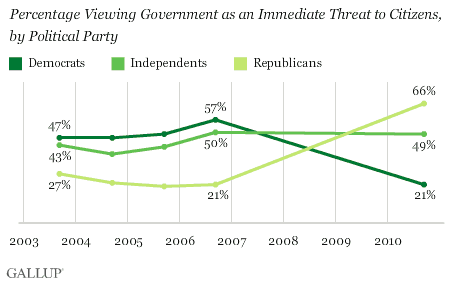Can an anti-government group founded on principals of anti-corporate thought, individual liberty and skepticism of government power survive in the wake of an electoral victory? What if the movement is supported by members of the establishment who go on to win elections; does the pressure that got them there remain? Put simply, can that movement survive it’s own success?
According to a recent study by the University of Michigan and the University of Indiana, the anti-war movement has largely collapsed since the election of Barack Obama in 2008. Immediately before the presidential election of 2004, anti-war protesters numbered approximately 500,000 during the Republican National Convention in New York. By October 2009, anti-war protest in Chicago produced only 100 protesters.
Since then little has changed with regard to the nation’s security apparatus. Guantanamo Bay has remained open, the Patriot Act has been extended with no revisions, warrantless wiretaps are still used and the nation remains engaged in two major wars. The war in Afghanistan has escalated significantly, with monthly death tolls looking more like Iraq’s, increasing more than 240 percent since the end of 2008.
The study’s authors, sociologists Michael Heaney and Fabio Rojas, attribute the collapse and current irrelevancy of the anti-war movement to the mass departure of committed Democrats, many of whom viewed the protests as a primarily anti-Republican movement. According to the study, the a drop in Democratic participation aligned with Democratic electoral victories in 2006 and 2008.
Studies done by The Gallup Organization confirm that voters tend to have greater fears about security and personal liberty when it’s not their guy in the Oval Office. In late 2006 immediately after Hurricane Katrina, 57 percent of Democrats viewed the government as an imminent threat to its citizens. Only 21 percent of Republicans felt that way then. Now, the image has almost completely reversed itself.
Now lets examine today’s hot new movement concerned about individual liberty, debt, and government surveillance — The Tea Party. Despite popular belief, the Tea Party originally formed in 2007 by Ron Paul supporters who oppose imperialism through war and manipulative monetary policy through the Federal Reserve.
(Click here for a history of the Tea Party, from its beginning to the present).
Like the anti-war movement after 9-11, it began fairly small, but still made fund-raising records, but beginning in 2009, the Tea Party was re-branded by GOP politicians as a more traditional anti-Democratic movement.
Karl Denninger, an organizer of the early Tea Party said, “Tea Party my ass. This was nothing other than the Republican Party stealing the anger of a population that was fed up with the Republican Party’s own theft of their tax money at gunpoint to bail out the robbers of Wall Street and fraudulently redirecting it back toward electing the very people who stole all the fucking money!” Later Denninger said, “I saw everybody fawning over Obama with the inauguration and yet here he was appointing people like Larry Summers and Tim Geithner to his team who were all part of creating the problem.”
Now that the reformed Tea Party has achieved success at the ballot box, will it survive Washington’s culture or will it dissolve like the anit-war movement? I suspect it will survive in some respect, because unlike the anti-war movement, the Tea Party can still be used by the partisan establishment to drum up future votes, where as the anti-war movement can no longer provide energy for the Democratic base raging against a machine which they now control. However, it won’t have any similarities to its anti-establishment roots.
In addition, Rojas said in the comments section of his website that new studies about the Tea Party and its views are currently being studied at the University of Indiana.



